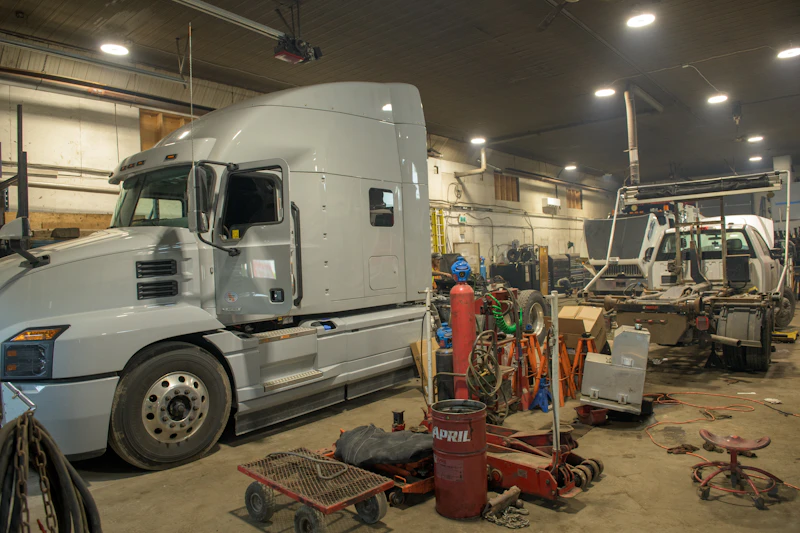Common Semi-Truck Winter Issues & How to Prevent Them

Heavy-duty vehicles may appear to be sturdy due to their large size, but they are just as vulnerable as smaller trucks and cars in the winter. In fact, driving on icy or snow-covered roads may be more challenging for a larger tractor, which requires more maneuverability and skid control. Additionally, the cold temperatures during the winter can cause certain vehicle components to become more prone to damage. By understanding which components are at risk, how to prevent damage, and how to handle it if it does occur, you can be prepared for any potential issue that winter may throw your way.
Dead batteries
The battery must work harder to start the engine when it is below freezing outside, and it may demand up to twice as much energy as needed on a warm day. Therefore, you should replace it with a new one if it is more than two years old or if you believe its capacity will not last through the cold months.
If the battery is not replaced when it needs to be, it can lead to more serious problems. The battery is responsible for starting the engine and providing power to various parts of the vehicle, such as the heating system and headlights. If the battery is overworked during the winter, it may eventually stop functioning. To prepare for these types of situations, it is a good idea to keep a set of jumper cables in your vehicle.
Frozen windshield wipers
One of the vehicle components that are most vulnerable during the winter is the windshield wipers. And despite their toughness and durability, they are susceptible to harm from the frigid weather over time. If your wipers are frozen when you go to turn them on, they are susceptible to tearing.
It may be incredibly unpleasant to have broken windshield wipers, particularly if you're trying to drive in the rain, sleet, or snow. Before going on the road, ensure they are in good working order. Replace the wiper blades with ones that are specifically designed for winter conditions.
Make it a practice to regularly wipe the windshield of ice and snow before you leave. You may use a windshield de-ice spray to do the task fast and effectively.
Low tire PSI
Checking your tire pressure before you drive throughout the winter is strongly advised since under-inflated tires do not perform well on snowy and slippery roads. Your tires lose one pound per square inch of temperature for every 10 degrees F, and it is thus never a good idea to drive if your tires are not filled to the recommended pressure level.
You may also utilize tire chains or snow chains to provide your vehicle with the most traction possible when driving over snow and ice. Find out whether states permit the usage of these items and use the correct number and size of chains in your vehicle.
Starting issues
Winter vehicle starting problems may be caused by a dead battery, a broken alternator, or a problem with the starter. Try starting your truck to see whether the problem is with the starter. The starter has to be changed if all of the power is functioning yet all you hear is the clicking of your truck trying to turn over.
Fuel filter clog
In the winter, the fuel filter in trucks can become clogged with sludge due to the diesel fuel gelling at low temperatures. Experienced truck drivers recommend using winter additives to prevent this from happening. However, these additives are not always used in southern regions. As an alternative, truckers suggest using cabin heat by letting the vehicle idle for long periods to keep the fuel flowing and reduce the risk of a clogged filter. If the fuel filter does freeze, it can be defrosted with a plug-in heater or replaced with a spare filter to get back on the road quickly.
Frozen locks and doors
It’s not unusual to find your truck doors frozen shut during the winter, especially those semi-trucks stored in outdoor lots for a few days. Sometimes the lock or handle may freeze, making entry impossible.
When possible, park your vehicle in a covered place to prevent frozen doors and locks. If this is not possible, mainly if you are out overnight delivering products, be sure to have a de-icer. Getting a de-icer spray or lock de-icer for your vehicle is simple since they are widely distributed online.
Final words
In winter, these are the most common problems you might encounter while driving your truck. By being aware of these issues, you can take appropriate action to avoid them and ensure a smooth and enjoyable winter driving experience.


.webp)
.webp)